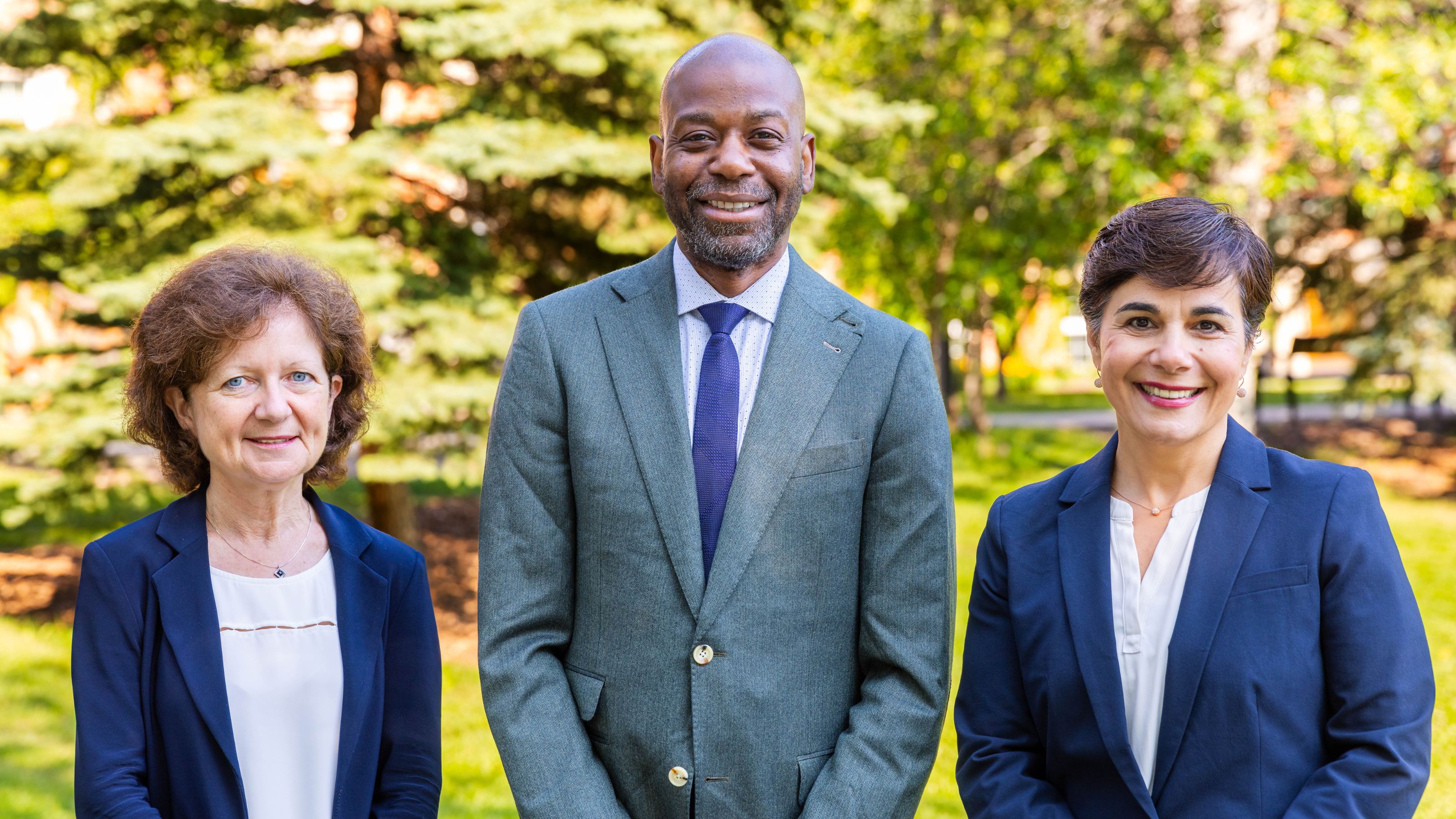On July 1, Brenda Hemmelgarn (Health Sciences) and Marvin Washington (Social Sciences and Humanities) joined Matina Kalcounis-Rueppell (Natural and Applied Sciences) as college deans and vice-provosts. Hear from this team of leaders on their vision for the colleges in the coming five years.
Over the last two years, interim college deans have built a strong foundation for the colleges. As the incoming college leadership team, we are honoured to continue to shape the future of postsecondary education and research at the U of A.
Colleges bring together expertise from across our faculties, harnessing collective strengths to advance discovery and the application of research as well as educate and prepare our students to be the scholars, leaders and problem solvers of tomorrow. Together, we will continue to build an integrated, interdisciplinary environment in which our research and education mission can thrive.
Interdisciplinarity in action
Three concepts lie at the heart of the interdisciplinary college model: transcending structural barriers to promote interactions, leveraging what works really well in distinct areas to benefit more people, and unlocking new possibilities for interdisciplinary research, teaching and learning. We are cultivating a culture of collaboration and innovation where diverse perspectives and expertise converge to address complex challenges and seize emerging opportunities.
One of our key priorities is to create an environment that facilitates complex partnerships and supports large-scale, transformative research and education initiatives. Deans and other senior leaders are collaborating with one another like never before.
An example of this in action are the recently announced Canada CIFAR AI Chairs — a $30-million investment from the U of A and the Alberta Machine Intelligence Institute (Amii) that will bring 20 new faculty members to our campuses in a cluster hire that spans the institution. These new faculty members will bolster our expertise in machine learning across broad areas that include health, energy and Indigenous leadership. These hires will also include appointments that cross faculties.
Student experiences
In addition to our focus on research, we are committed to supporting a consistent and exceptional student experience. Colleges ensure that the best practices for the student experience that exist at the U of A are leveraged to benefit all students. For example, we are helping to improve coordination of the course calendar and timetabling between faculties and the registrar's office, ensuring course availability and timing that works for students' schedules. Colleges support a wide range of experiences to enrich the student experience. The disciplinary alignment of the colleges makes this easy to do across faculty boundaries.
Colleges also support faculties in providing flexible course offerings, embracing innovative teaching methods and ensuring that our curriculum reflects the evolving needs of our students and the world they will enter upon graduation. The creation of new, interdisciplinary programs and experiences is made possible through the college model, such as new course-based master's programs in data science and sustainability. Another example is the College of Health Sciences Interprofessional Launch, a collaborative in-person event that brings together more than 1,000 undergraduate health sciences students to foster a shared understanding and build relationships between disciplines. We are also excited about expanding the Department of Biomedical Engineering, which offers interdisciplinary graduate programs with faculty members that cross colleges to advance research at the intersections of medicine, dentistry, biology, and engineering. This will enhance collaboration and interdisciplinarity at the U of A.
Additionally, colleges are providing streamlined and specialized administrative support in areas such as academic integrity, student systems and program coordination. These fundamental services support faculties in providing the best student experience possible.
For example, prior to the creation of colleges, approximately 80 staff members from across our campuses supported course scheduling and acted as points of contact for the Registrar’s Office in addition to their regular duties. Now, we have small specialized teams at the college level that focus on course scheduling, shifting from 80 generalized points of contact to 17 specialized points of contact coordinated at the colleges. These specialized staff have established a community of practice across the institution, streamlining services and providing a superior level of service, while simultaneously allowing staff members in faculties to refocus on their core duties.
Advocacy
As your college deans and vice-provosts, we serve as your connection to senior leadership at the U of A and to the communities that we serve. We are committed to fostering strong relationships and open lines of communication both within our university system and beyond it. By engaging in strategic conversations, we are creating an environment where all faculties can thrive and contribute to the collective success of our community at the U of A.
A great example of this One University principle in action is the recent Canada-Wide Science Fair held in Edmonton. We welcomed roughly 400 of the nation’s top STEM students to the U of A to showcase the research and education possibilities of post secondary studies here, and leveraging the college model we were able to work together across colleges and with stand-alone faculties for a highly successful event.
We are excited and humbled to embark on this journey as College Deans. We look forward to working together with our incredible faculty, staff and students to make a lasting impact and build a brighter future for all. Over the next six months, we will be working on an action plan in response to the College Model Review completed by Dru Marshall. We look forward to sharing this with you soon.
Brenda Hemmelgarn, College Dean and Vice-Provost, College of Health Sciences
Matina Kalcounis-Rueppell, College Dean and Vice-Provost, College of Natural and Applied Sciences
Marvin Washington, College Dean and Vice-Provost, College of Social Sciences and Humanities
